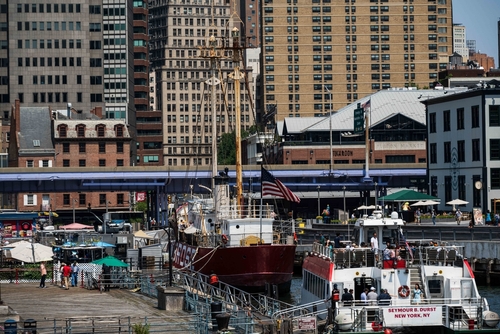|
Getting your Trinity Audio player ready...
|
South Street Seaport Sees Stock Price Plummet in Early Stages as Public Company
By: Benyamin Davidsons
Last week, South Street Seaport began its journey as an independent public company. The start was bumpy to say the least.
As reported by Crain’s NY, shares of Seaport Entertainment Group have lost a fifth of their value since they went public, following the enterprise’s spin off from developer Howard Hughes Holdings (NYSE: HHH). The new stock, ticker symbol SEG on the NYSE American Stock Exchange, traded at just above $25 per share, as of Monday midday, down from its debut of $31.50 last Thursday. “Today is an exciting milestone for Seaport Entertainment Group as we begin this new phase as an independent public company. We’ve built a team of experienced industry professionals, with the goal of creating a best-in-class entertainment organization underpinned by our quality portfolio in top-tier, high-barrier-to-entry markets,” said CEO Anton D. Nikodemus. “We are committed to redefining the entertainment experience for our guests, and I’m confident our unique assets, strong partnerships, and newly constructed team are capable of creating long-term value.”
Led by led by President and Chief Executive Officer Anton Nikodemus, the Seaport Entertainment Group includes a wide array of businesses. The enterprise is anchored by the historic Seaport neighborhood in Lower Manhattan, which includes 478,000 square feet of primarily retail, restaurant and entertainment offerings, the 3,500-person concert venue on The Rooftop at Pier 17, a mixed-use development site at 250 Water Street, the Tin Building by Jean-Georges ( which is a culinary marketplace), air rights belonging to the Fashion Show mall on the Las Vegas Strip, and a Las Vegas minor-league baseball team along with its ballpark.
Last year, the enterprise produced a $16 million net operating loss in total. Howard Hughes wrote down the Seaport’s asset value by more than $700 million last year, because the business wasn’t producing the projected cash flow. “Stabilization and profitability are taking longer than expected,” acknowledged Howard Hughes, which plans to focus on residential development after the spinoff. Hughes has blamed the slow success on rainy weather, saying crowds didn’t visit the Seaport due to inclement weather. Per Crain’s, Howard Hughes had spent close to $1 billion making improvements to the landmarked 500,000 square-foot neighborhood, after purchasing part of it from the Milstein family for $180 million in 2018.
Seaport didn’t reply to Crain’s requests for comment.
Large companies sometimes like to spin off businesses into separate public companies, so that the management can focus exclusively on its own business. Sometimes, stock prices in both enterprises benefit. Per Crain’s, however, many spinoffs end up not being big wins for investors. One of the challenges for the newly independent companies, is that they need to now spend on their own management teams, internal systems and processes, making what Wall Street calls “dis-synergies.” A study by Bain Consulting, which looked at 350 public spinoffs valued at over $1 billion, between the years 2000 and 2020, revealed that 50% failed to add any value for shareholders, and that 25% destroyed a “significant amount.” “The evidence is overwhelming,” the researchers wrote in the article published in the Harvard Business Review two years ago.




